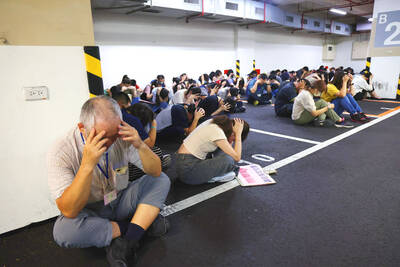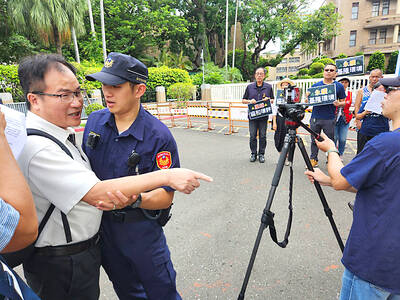The Consumer Protection Committee yesterday said that 11 of 30 herbal tea ingredients (about 37 percent) it tested for pesticide residue failed a random inspection.
Herbal tea made with a single type of herb or a mixture of various herbs is a popular beverage in Taiwan, especially in the summer, and while some people like to buy ready-made tea from beverage stores or in bottles, some enjoy choosing dried ingredients and brewing their own tea.
Consumer ombudsmen and local health department officials conducted a random inspection of four common herbal tea ingredients — Chinese mesona (仙草), beggarticks (咸豐草), Wedelia (蟛蜞菊) and Glossogyne tenuifolia (風茹草) — from herbal tea shops, Chinese medicine stores and herbal tea factories in July.
Pesticide residue analysis and a test for dithiocarbamates, a type of fungicide, showed that 11 of the 30 items tested contained pesticide residues above the allowed tolerance level.
All six of the Wedelia items tested failed the inspection, while the only Glossogyne tenuifolia item to be tested also failed the inspection by containing six types of pesticide residue that exceeded the allowed tolerance level.
Two of the 15 Chinese mesona teas and two of the eight beggarticks teas tested also failed the inspection.
Food and Drug Administration Northern Center official Wei Jen-ting (魏任廷) said the pesticides found in the herbal tea ingredients were all legal, but the residue levels were too high.
The committee said that it has asked local health departments to investigate the origins of the herbal tea ingredients and so far one company has been fined NT$60,000 for contravening the Act Governing Food Safety and Sanitation (食品安全衛生管理法).
Eight cases have been transferred to local agricultural departments to investigate the use of pesticides and two cases are still being investigated by local health departments, it said.
If it is proved that farmers have used illegal pesticides they face a fine of NT$15,000 to NT$150,000 for violation of the Agro-pesticides Management Act (農藥管理法).
Senior consumer ombudsman Wang Te-ming (王德明) urged people not to pick wild herbs, especially along public roads, because township and district offices spray pesticide regularly to maintain environmental sanitation.

Taipei on Thursday held urban resilience air raid drills, with residents in one of the exercises’ three “key verification zones” reporting little to no difference compared with previous years, despite government pledges of stricter enforcement. Formerly known as the Wanan exercise, the air raid drills, which concluded yesterday, are now part of the “Urban Resilience Exercise,” which also incorporates the Minan disaster prevention and rescue exercise. In Taipei, the designated key verification zones — where the government said more stringent measures would be enforced — were Songshan (松山), Zhongshan (中山) and Zhongzheng (中正) districts. Air raid sirens sounded at 1:30pm, signaling the

Environmental groups yesterday filed an appeal with the Executive Yuan, seeking to revoke the environmental impact assessment (EIA) conditionally approved in February for the Hsieh-ho Power Plant’s planned fourth liquefied natural gas (LNG) receiving station off the coast of Keelung. The appeal was filed jointly by the Protect Waimushan Seashore Action Group, the Wild at Heart Legal Defense Association and the Keelung City Taiwan Head Cultural Association, which together held a news conference outside the Executive Yuan in Taipei. Explaining the reasons for the appeal, Wang Hsing-chih (王醒之) of the Protect Waimushan Seashore Action Group said that the EIA failed to address

The number of people who reported a same-sex spouse on their income tax increased 1.5-fold from 2020 to 2023, while the overall proportion of taxpayers reporting a spouse decreased by 4.4 percent from 2014 to 2023, Ministry of Finance data showed yesterday. The number of people reporting a spouse on their income tax trended upward from 2014 to 2019, the Department of Statistics said. However, the number decreased in 2020 and 2021, likely due to a drop in marriages during the COVID-19 pandemic and the income of some households falling below the taxable threshold, it said. The number of spousal tax filings rebounded

A saleswoman, surnamed Chen (陳), earlier this month was handed an 18-month prison term for embezzling more than 2,000 pairs of shoes while working at a department store in Tainan. The Tainan District Court convicted Chen of embezzlement in a ruling on July 7, sentencing her to prison for illegally profiting NT$7.32 million (US$248,929) at the expense of her employer. Chen was also given the opportunity to reach a financial settlement, but she declined. Chen was responsible for the sales counter of Nike shoes at Tainan’s Shinkong Mitsukoshi Zhongshan branch, where she had been employed since October 2019. She had previously worked